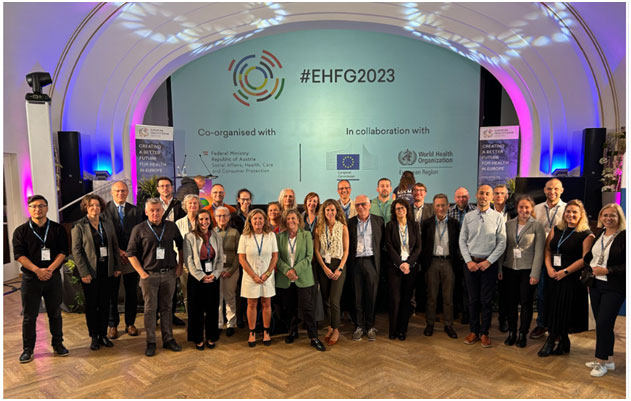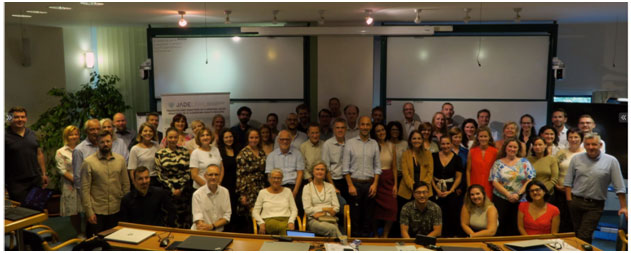Focus Article 1: JADECARE organizes its Final Conference within the European Health Forum Gastein (EHFG) 2023 to share the results and impact
The conference was held in Gastein (Austria) from 26 to 29 September 2023.
The European Health Forum Gastein 2023 focused on addressing the problems faced by health systems before the advent of COVID, such as the transformation of primary care and social care, inequalities in access to care, or the ageing of the population and the increase in non-communicable diseases. Likewise, the so-called “subsequent permacrises” – including an ongoing pandemic, the war in Ukraine, the cost-of-living crisis and the climate emergency – have only aggravated the situation of European healthcare systems and stretched health and care workers to the limit with professional fatigue and burnout. Since its founding in 1998, this health forum has become a key platform for politicians, senior health officials and experts in the field of health. In addition, the EHFG has established itself as an indispensable institution in the field of intersectoral European health policy and has made a decisive contribution to the transfer of experience and health information between Member States.

Within the program of the EHFG 2023, on September 28, a specific session was organized entitled “Accelerating the path to digitally-enabled integrated care. Sharing best practice for health systems transformation in the JADECARE Joint Action.” The objective of the session was to highlight the impact achieved in JADECARE Joint Action, coordinated at the European level by Biosistemak (formerly Kronikgune) that targeted more than 4 million people in the EU at different levels (local, regional and national). The impact achieved by the project covers aspects such as digital transformation, reorganization of care pathways, change management and citizen empowerment, among others. The session also served to share the knowledge gained from the transfer of four original good practices to 21 European regions and healthcare contexts.
It is worth mentioning the participation of the Basque Government Minister of Health, Gotzone Sagardui, the director of the Semmelweis Institute and former Minister of Health of Hungary, Miklós Szócska, and Paloma Calleja, from the Subdirectorate of Quality of Care of the Ministry of Health of Spain in the session of the JADECARE project. Together with various members of the Consortium, Mart Kull, Chief Medical Officer of the Viljandi Hospital (Estonia), Christina Plomariti, Research Associat at the Aristotle University of Thessaloniki (Greece) and Jelka Zaletel, National Institute of Public Health of Slovenia they highlighted and discussed about the challenges faced by public health systems in Europe today, such as new technologies, digital transformation, costs, lack of professionals, and an increasingly ageing population, which makes it difficult to provide universal, equitable, high quality and financially sustainable care.
Watch the full session clicking on the following link: https://ehfg.live/recordings/s15
Visit the official EHFG website to learn more about the topics covered and the full program: https://www.ehfg.org/
Got newsletter forwarded? Click here for subscribing for your own copy
Focus Article 2: Outcomes, Results and Impact of JADECARE, including PHD Thesis: Predictive Modelling for Personalised Multimorbidity Management by Rubèn González-Colom
In order to deal with the heterogeneity of the original Good Practices transferred, but also the mix of transfer aims of the systems adopting them, a three-step implementation strategy was designed. This strategy aimed to serve as a guideline for the JADECARE implementation sites to facilitate the uptake in routine practice of Good Practices and it included a series of methods and techniques, concrete procedures and recommendations to enhance the adoption and sustainability of the JADECARE original Good Practices with demonstrated success.
In this framework, all the adopters carried out a SWOT analysis which allowed to identify more than 165 needs in their original contexts. Likewise, more than 350 indicators were defined to monitor the implementation process of the action plans that the adopters developed. Throughout this process of scaling up good practices, we highlight the study visits, thematic workshops and other activities organized between the participating organizations for the exchange and transfer of knowledge.
The action plans defined in the 21 European contexts, based on the four original JADECARE Good Practices, have allowed to build and implement 64 projects deployed at local, regional, and national levels. Eleven of the 64 projects focussed on risk stratification, 36 on integrated care, eight on developing local regulations and nine on patient empowerment.
The digitally supported measures led in almost all of the regions involved in the project to an increase in interdisciplinary and cross-sectoral care for the population. As a result, 76 % of the 21 participating regions were able to confirm new or modified health policy measures, while all of them considered that they improved knowledge and skills of professionals involved, and 62% of them confirmed changes in digital services, including coordination and communication systems, citizen empowerment tools, patient reported data and tele-medicine, data analytics at individual or population level or digital health system infrastructure and information and process management systems.
As summarized in Deliverable 4.2 (Blueprint on Learning from Good Practices) a thorough initial planning with realistic ambitions, considering the context and legal issue and evaluations is very important. This document contains guidelines and operational procedures for the transfer of JADECARE good practices, including key elements to ensure scale-up and sustainability after the end of the project. Another key learning point reported by the adopters was the increased knowledge to use data and build a population approach using the opportunity to test the innovation in the healthcare system in a real scenario, with a clear methodology and concrete support. The in-depth knowledge of good practices achieved throughout the implementation process, also thanks to the availability of the oGP leaders, and in particular the way in which the practices had already been successfully implemented in different contexts, helped to prioritise the needs of healthcare institutions in relation to digital health, and contributed to a multidisciplinary vision/approach on how to address the same topic/problem in the right sequence.
Some other recommendations include stablishing a well-organised group of people involving the relevant actors, health professionals and patients from the beginning, and being supported by active engagement of healthcare leaders, practitioners and staff, that should implement the local good practices in a strategically developed plan, in alignment with existing policies/initiatives/strategies. Moreover, constant monitoring based on a structured methodological framework including risk management, with a collection of data and information on the progress of the project, is described to facilitate carrying out comparative analyses between the initial plans and the actual progress of the projects. As much as it is to work for the standardization of the practices because it allows for the efficient scaling up or down of project activities, ensuring that resources are utilised optimally, and project objectives are met consistently.
In addition, a key aspect of Joint Action has been to ensure the sustainability of the actions, as it is described in Deliverable 4.3 (Characteristics of JADECARE practices, leading to sustainability and integration in national policies). For this means, a dedicated Sustainability Strategy was developed and plans for all the 21 adopters were built describing the involvement of Member States to support the continuity of the practices transferred and integrate the results in their national policies to reinforce the visibility of European Union co-funding and institutions outside JADECARE (EIT HEALTH, other Member states, or International Organizations).
Three central core elements for a successful sustainability strategy identified in JADECARE were:
- A supportive political environment,
- The stakeholders’ own responsibility for sustainability and
- T culture of cooperation with the joint willingness to find consensus.
Finally, as outlined also in Deliverable 2.4 (Final report on Dissemination) and 2.5 (Layman of the final report) the project has been presented at 45 scientific congresses and ensured an exchange of knowledge at over 30 internal events. The official JADECARE webpage received a lot of interest and visits during the three years of the projects, eleven YouTube videos have been produced (JADECARE EU – YouTube) and over 400 followers have been gained on social media channels.
Initial results have already been made available to the scientific community in eight publications and further publications have been submitted or are at an advanced stage of preparation. The Deliverables of JADECARE will be publicly available and serve as a robust repository of knowledge and recommendations, and as invaluable advice for other European implementers and future transfer projects. It is specially remarkable the publication of the PHD Thesis: Predictive Modelling for Personalised Multimorbidity Management of Rubèn González-Colom, defended at the University of Barcelona, Fall 2023.
This PhD thesis was mainly undertaken within the framework of the Catalan original Good Practice related to the European “Joint Action on implementation of digitally enabled integrated person-centered care” (JADECARE). This initiative was initiated to focus on pivotal components of transforming the healthcare system in the European Union towards digitally supported integrated care. The PhD thesis consists of five articles that address three interconnected facets of digitally supported Health Risk Assessment (HRA).
Multimorbidity management, a growing healthcare concern, necessitates precise HRA tools to increase the efficacy of its interventions and mitigate the disease burden. HRA represents a fundamental cornerstone for comprehending the impacts of multimorbidity, allowing it to inform health policies and better allocate healthcare resources. In addition, HRA enables the implementation of personalised healthcare strategies through patient stratification, facilitating the identification of at-risk individuals and advising the development of targeted interventions to optimise health outcomes.
Three use cases are addressed in the thesis. While distinct, they form a cohesive, and novel, analytical approach to different facets of multimorbidity management. Moreover, the research outcomes show the high potential of articulating population-based and clinically oriented HRA as well as the challenges and opportunities for future work.
3rd Consortium Meeting and Stakeholder Forum
JADECARE 3rd and final Consortium meeting was held on 27 September 2023 in Budapest (Hungary) in a hybrid format and with the participation of more than 60 people. The event served to ensure that the project was properly developed as far as the third year of the Joint Action, to foster knowledge exchange on Local Good Practices implementation among JADECARE partner and also to finally close the project and summarize the achievements of the three years of the Joint Action
The final project meeting also served to organize the last JADECARE Stakeholder Forum. This forum aimed to facilitate the exchange of experiences and the creation of knowledge networks between JADECARE participating organizations and relevant stakeholders.

Over the three years of the project, various meetings have been organized with external stakeholders including representatives from health systems, researchers, and academia interested in collaborating with the JA to discuss the status and achievements of JADECARE, emerging issues, as well as other ideas, solutions, and networking possibilities about further supporting digitally enabled integrated person-centred care in Europe. The forums have also involved leading healthcare industries to contribute to the improvement of competitiveness and economic growth opportunities for the EU industry.
The main theme of the last forum organized in Budapest was “Person-centred and digitally enabled integrated care – Sustainability of implementations”. The objectives of this meeting were initially to present the experiences, learnings, and achievements of JADECARE and share the sustainability plans of some Next Adopters to maintain and further develop their local good practices. Fort his means four organizations presented their experiences, learnings, and sustainability actions and plans developed in the framework of the project: Agenzia Regionale Sanitaria Tuscany (ARS Toscana, Italy), Semmelweis University Health Services Management Training Centre (SU-HSMTC, Hungary) Dienststelle Selbstbestimmtes Leben, (DSL, Belgium) and Salud de Castilla y León (SACYL, Spain).
In the second part of the meeting, the objectives were to discuss (i) stakeholder involvement and needs to make digital solutions that support integrated patient-centered care pathways sustainable, in order to become an everyday reality in their systems and (ii) also the challenges and new developments in Europe for value-integrated health and social care services and how they can be supported by digital solutions.
Prof. Miklós Szócska, Dean of the Health Service Faculty at Semmelweis University and Director of the Healthcare Service Management Training Centre (SU-HSMTC) in Budapest, welcomed everybody to this important Forum on innovative and new ways of care for patients that JADECARE represented with its use cases, best practices and approaches. After that, a stimulating key note on “Pressure points and solutions for person-centred integrated care supported by digital tools and pathways ” by Donna Henderson from Technology Enabled Care, TEC, Scotland, highlighted the need to change the current model of medical care in order to face the challenges due to growing chronic diseases and demographic change to provide successful medical health and care services. She recommended to manage demands and capacity challenges, to contain costs by improving management of physical and mental diseases, to move to prevention, anticipation and prediction of risk, to relieve pressure on and support staff, caregivers and families, and to find novel ways of creating additional capacity within the system – all supported efficiently by digital technology and tools.
After the presentation of the results and experience, learnings and sustainability actions and plans of the four selected Next Adopters, in the second part of the Stakeholder Forum seven renowned experts in the field of integrated and digital health and care discussed the topics of the objectives of the meeting with the onsite and online audience of around 80 participants.
- Miklós Szócska (SU-HSMTC, Hungary)
- Marc Lange (European Health Telematics Association, EHTEL, EU)
- Sergio González, (European Institute of Innovation and Technology, EIT Health, Spain)
- Donna Henderson (TEC Scotland)
- Ewout van Ginneken (European Observatory on Health Systems and Policies, Berlin)
- Albert Alonso (Intl. Foundation for Integrated Care, ICIC)
- Jan Pfeiffer (European Expert Group on Transition of institutional to community-based care)
The experts touched upon different aspects of challenges and chances to enhance person-centred integrated care, granting valuable pieces of advice. They made a distinct point that Digital Health has to be developed into a “Systems capability“ rather than a one-time development of digital solutions of certain groups of developers. They acknowledged the achievements of JADECARE and recommended to lead the experiences learnt into a permanent “JADECARE clearing house” that supports the digital systems capability transformation of health systems throughout Europe.
On a political scale the experts drew the attention of the audience to the Digital Health Uptake (DHU) project including the DHU radar tool for the analysis and monitoring of the potential for technological innovation and uptake of digital health solutions in Europe (Digital Europe Programme). The aim of the DHU project is to facilitate the alignment of policies, strategies, instruments and activities to advance the uptake of digital health solutions and services in Europe. As a hands-on project example from the health care industry innovators and adopters’ side, the audience enjoyed the introduction of F3T, the Framework for Fast Fast-Track of Digital Health Solutions, to streamline and fasten the adoption of digital health applications in Spain in an aligned manner.
The experts recognized that the achievements of JADECARE can ensure a positive impact on digital health service tools users (e.g. improvements in their health outcomes and improved satisfaction with services), on professionals involved in delivering the services, as well as on service providers (e.g. reduced expenditure and hospital readmissions). An as simple as possible, combined and for all stakeholders equally accessible approach is necessary though in order to successfully improve quality, performance and safety in health and social care for people living with chronic and complex conditions. At the same time all present Stakeholders were encouraged to ensure that people living with chronic and complex conditions receive the necessary care in line with their particular needs and preferences.
Special Message: JADECARE Coordinator saying goodbye:
- JADECARE, an outstanding Joint Action
- For the challenging mandate of the EC
- For the innovative transfer approach
- For the heterogeneity of Health systems represented
- But above all and without any doubt…for the excellent group of people that have formed it
We extend our warmest congratulations to everyone within the JADECARE family and we look forward to continuing our collaboration and fostering innovative advancements in healthcare services together.
Got newsletter forwarded? Click here for subscribing for your own copy
JADECARE Newsletter Subscription:
Load content below to proceed
Click on the button to load the content from 8f23b36d.sibforms.com.
